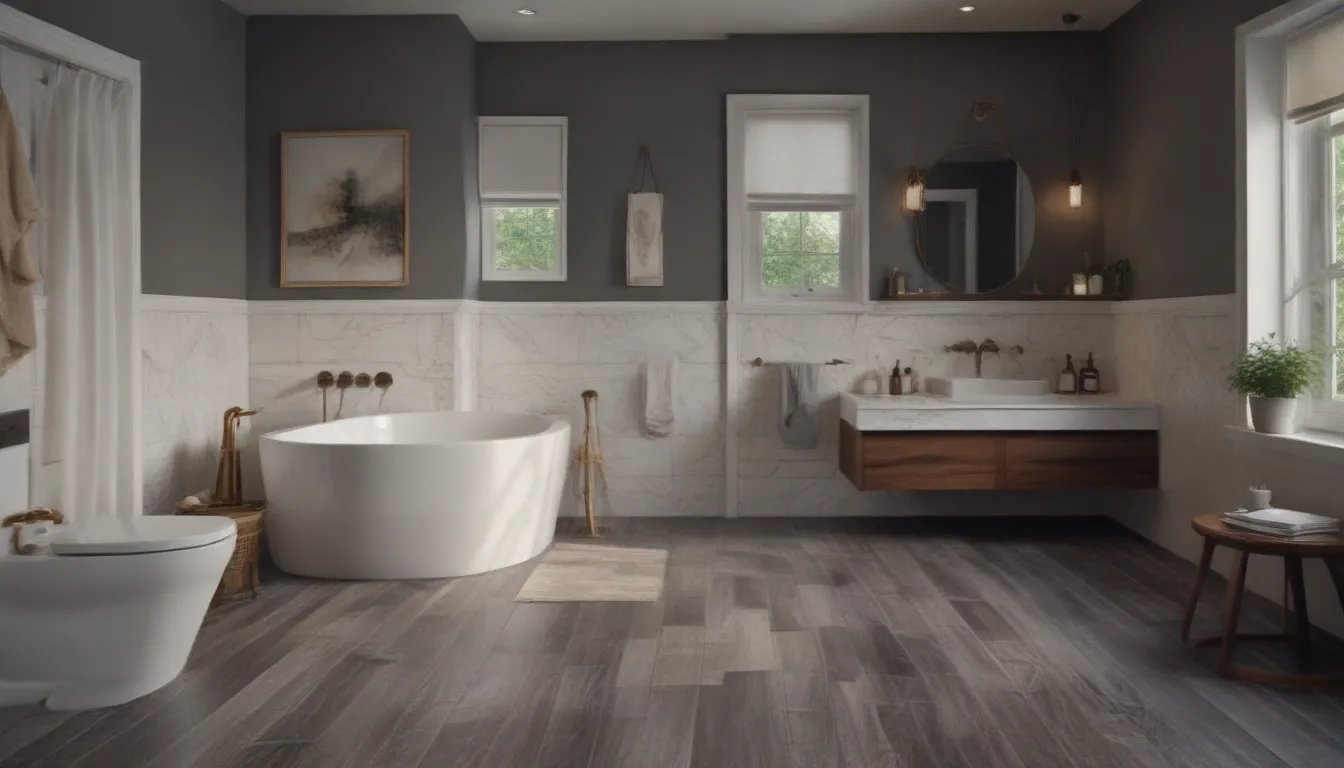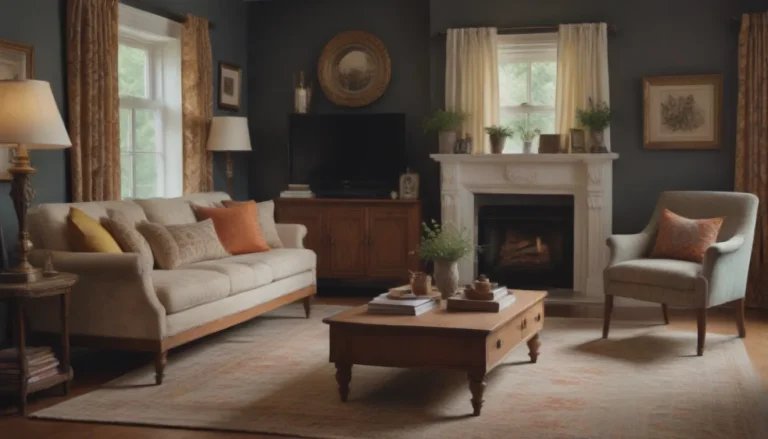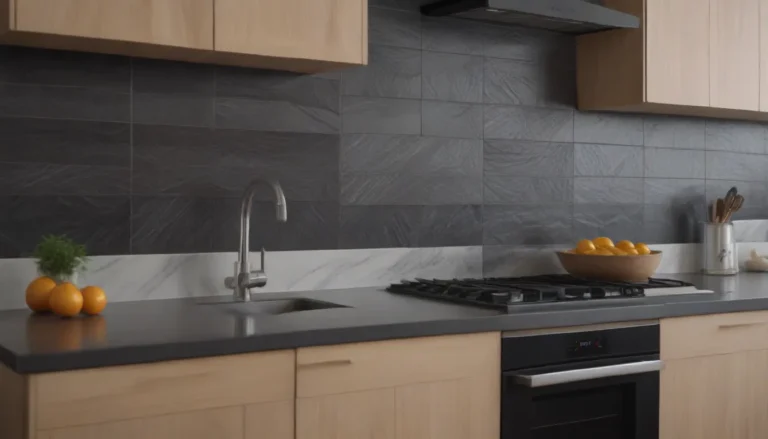Upgrade Your Bathroom with the Best Flooring Options

Are you looking to renovate your bathroom and struggling to decide on the best flooring option for your space? Choosing the right flooring for your bathroom involves considering various factors such as performance, durability, appearance, cost, and ease of installation. While aesthetics are essential for most areas of your home, in the bathroom, performance is key as it needs to withstand water and moisture exposure. With a wide variety of options available, it can be overwhelming to choose the perfect flooring for your bathroom.
In this comprehensive guide, we will explore popular bathroom flooring options, their pros and cons, and provide valuable insights to help you make an informed decision that suits your specific needs and preferences.
Porcelain or Ceramic Flooring Tiles
Porcelain and ceramic tiles are a popular choice for bathroom flooring due to their waterproof properties, stylish designs, and affordability. Porcelain tile, in particular, is denser than ceramic tile, providing enhanced durability and longevity. However, porcelain tiles can be brittle and prone to cracking upon impact. Ceramic tiles offer a wide range of customization options, from different sizes and shapes to designs that mimic wood or stone.
Pros of Porcelain or Ceramic Flooring Tiles:
- Waterproof: Ideal for bathrooms with high moisture levels.
- Stylish: Available in various designs to elevate your bathroom’s appearance.
- Durable: Resistant to wear and tear.
- Customizable: Wide range of options to suit your preferences.
- DIY-Friendly: Can be installed with proper technique.
Cons of Porcelain or Ceramic Flooring Tiles:
- Brittle: Porcelain tiles can be prone to cracking.
- Hardness: Not as comfortable underfoot for prolonged standing.
- Professional Installation: May require skilled labor for precise cutting and installation.
Stained Concrete Bathroom Flooring
Concrete flooring is a modern and industrial choice for bathroom floors, offering a unique aesthetic. Stained concrete floors add variety to the classic poured concrete option, and they are low maintenance, durable, and easy to clean. However, concrete can be slippery when wet, posing a safety concern in bathrooms.
Pros of Stained Concrete Bathroom Flooring:
- Low Maintenance: Easy to clean and maintain.
- Durable: Long-lasting flooring option.
- Modern Aesthetic: Adds a contemporary vibe to your bathroom.
- Waterproof: Resistant to moisture damage.
Cons of Stained Concrete Bathroom Flooring:
- Slippery: Care should be taken to prevent slips and falls.
- Coldness: Can be uncomfortable underfoot.
- Hardness: Not as forgiving as other flooring materials.
Vinyl Bathroom Flooring
Vinyl flooring is a popular choice for bathrooms due to its waterproof properties, ease of installation, and affordability. With options like sheet, plank, and tile vinyl, you can find the perfect style for your bathroom. Sheet vinyl is a great choice for bathrooms with high water exposure, while luxury vinyl plank flooring offers a stylish and DIY-friendly option.
Pros of Vinyl Bathroom Flooring:
- Waterproof: Ideal for moisture-prone areas.
- Affordable: Budget-friendly flooring option.
- Easy to Install: Suitable for DIY projects.
- Variety: Numerous style options available.
- Low Maintenance: Simple cleaning and upkeep.
Cons of Vinyl Bathroom Flooring:
- Poor Resale Value: May not add significant value to your home.
- Vulnerability to Damage: Can be prone to bumps or gaps in the subfloor.
- Durability: Not as long-lasting as some other flooring materials.
Natural Stone Bathroom Flooring
Natural stone flooring, including marble, granite, and limestone, offers a luxurious and durable option for bathroom floors. While natural stone is hard, durable, and aesthetically pleasing, it can be cold, slippery, and expensive. Texturing the stone or installing radiant heating can help mitigate these issues.
Pros of Natural Stone Bathroom Flooring:
- Luxurious Appearance: Adds elegance to your bathroom.
- Durable: Long-lasting and resistant to wear and tear.
- Value: Excellent resale value for your home.
- Variety: Different types of natural stone available.
Cons of Natural Stone Bathroom Flooring:
- Costly: One of the more expensive flooring options.
- Coldness: Can be uncomfortable in bare feet.
- Slippery: Requires precautions to prevent falls in wet conditions.
Cork Bathroom Flooring
Cork flooring is a sustainable and eco-friendly option for bathroom floors, made from the bark of cork trees without harming the trees. While not waterproof, cork is water-resistant, resists mold and mildew, and is easy to replace if damaged. However, it can be affected by humidity and standing water.
Pros of Cork Bathroom Flooring:
- Sustainable: Environmentally friendly choice.
- Water-Resistant: Resists moisture and mold growth.
- Easy Replacement: Simple to replace damaged sections.
- Soft Underfoot: Comfortable for bare feet.
Cons of Cork Bathroom Flooring:
- Humidity Sensitivity: Can expand or contract in high humidity.
- Standing Water: Prone to damage if exposed to excess moisture.
- Cleaning Care: Requires special cleaning agents and precautions.
Bamboo Bathroom Flooring
Bamboo flooring offers a hardwood look with increased durability and moisture resistance compared to traditional hardwood. While not waterproof, bamboo can withstand heavy use and is more affordable. Care should be taken to prevent standing water and excess splashes in bathrooms with bamboo flooring.
Pros of Bamboo Bathroom Flooring:
- Hardwood Look: Adds a stylish and natural appearance.
- Moisture Resistance: More durable than traditional hardwood.
- Affordability: Cost-effective alternative to hardwood.
- Durability: Stands up to heavy use in bathrooms.
Cons of Bamboo Bathroom Flooring:
- Not Waterproof: Prone to damage from standing water.
- Refinishing Difficulty: Cannot be refinished like hardwood.
- Cleaning Care: Requires specific cleaning agents for maintenance.
Flooring to Avoid in the Bathroom
Wall-to-Wall Carpeting
Carpeting retains moisture and is not suitable for bathrooms. If you choose to have carpet, opt for low-pile, inorganic materials like nylon or olefin.
Solid Hardwood
Solid hardwood is not recommended for bathrooms due to moisture vulnerability. If you prefer wood, engineered wood is a better choice for high-moisture areas.
Alternative Flooring Options
Engineered Wood Bathroom Flooring
Engineered wood offers the look of real wood with enhanced resistance to moisture. This flooring option is ideal for those who desire a natural wood appearance in the bathroom.
Laminate Bathroom Flooring
Laminate flooring is a cost-effective and water-resistant alternative to solid hardwood. While not completely waterproof, laminate can work well in bathrooms with proper precautions.
In conclusion, when choosing the best flooring for your bathroom, consider factors such as performance, durability, appearance, cost, and ease of installation. Reflect on your specific needs, preferences, and budget to select the flooring option that best suits your bathroom renovation project. Whether you opt for porcelain tile, stained concrete, vinyl, natural stone, cork, bamboo, or an alternative option, ensure that it aligns with both your aesthetic and practical requirements for a successful bathroom upgrade.
By weighing the pros and cons of each flooring material and understanding their unique characteristics, you can make an informed decision that enhances the overall look and functionality of your bathroom space. Happy renovating!
Remember, improving your bathroom flooring can transform the entire look and feel of the space. Choose the flooring that best suits your needs and style preferences to create a bathroom that is both beautiful and functional.





